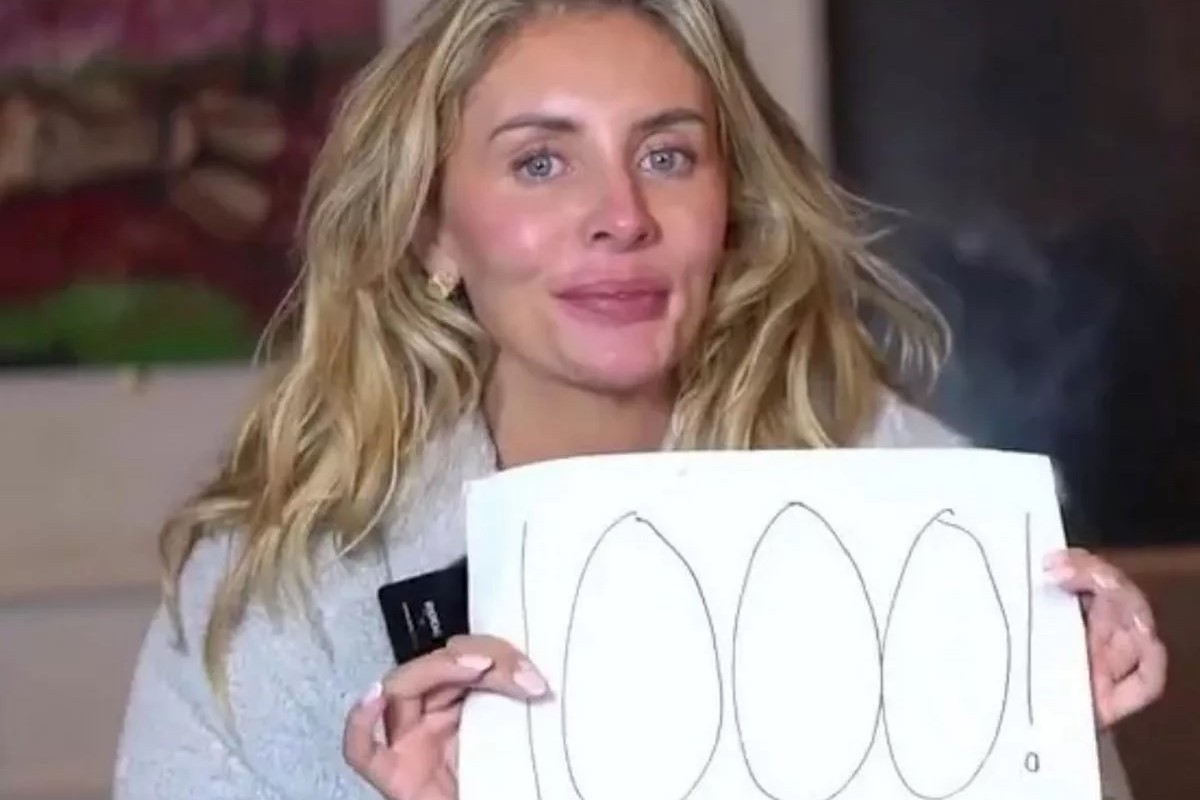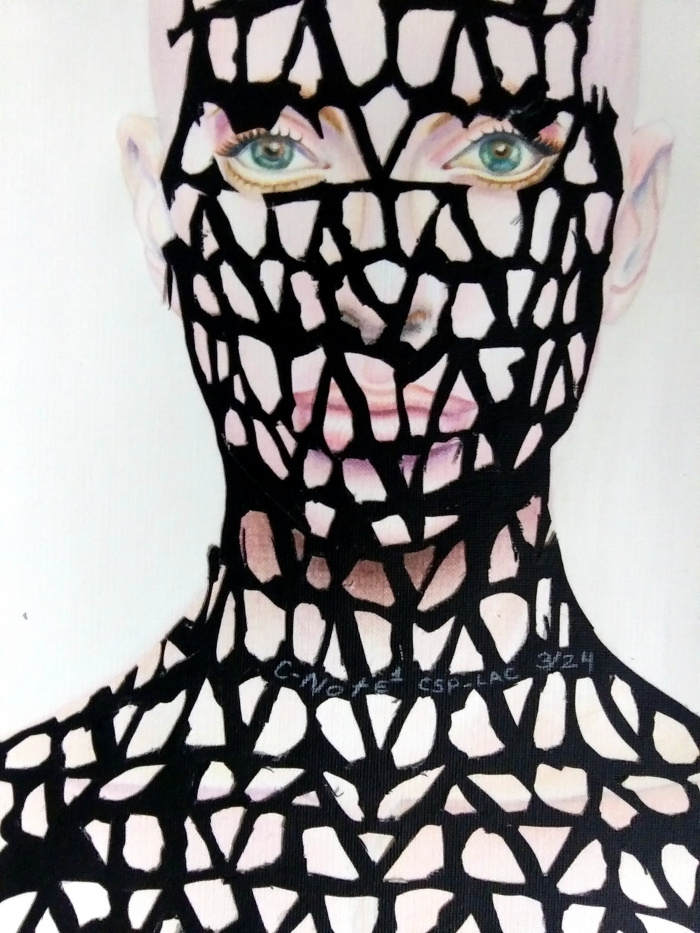
Last month, British OnlyFans performer Lily Phillips went viral for sleeping with 100 men in a day; this month, British OnlyFans performer Bonnie Blue has one-upped Phillips, claiming to have slept with 1,000 men ‘in 12 hours’. (Blue has been widely reported to have broken the record for most sexual partners in one day, though the accuracy of the previous ‘record’ appears dubious.) News outlets, both in the UK and abroad, have responded feverishly to these stunts, with torrents of titillating profiles of both women, alongside extended wailings about sexual depravity and the corruption of family values. From the Star to the Mail, UK tabloids want you to be very, very worried about OnlyFans. But would ‘sex challenges’ like these exist, or be profitable, if it wasn’t for those same tabloids?
OnlyFans has massively changed the landscape of online sex work since it was founded in 2016. It has over 300 million worldwide users – about four million of whom create content – and is mainly known as a subscription service for paywalled pornography, though there are nonsexual and safe-for-work creators on the platform. OF is a relatively accessible and controlled way to sell sexual photos and videos; it also allows some creators to separate their sexual and nonsexual content more easily than ‘porn star’ roles would generally allow. This has spurred cultural panics about sex work being available to more women – particularly more young, middle-class women – and incentivising them to sexualise themselves. (OnlyFans creators average an unremarkable $2,000/£1,650 per year, but the highest-earning creators pull in millions.)
It’s not a coincidence that Lily Phillips and Bonnie Blue both feel like ideal manifestations of class anxiety about sex work. Phillips is a fresh-faced 23-year-old who started on OnlyFans during Covid, then dropped out of the University of Sheffield to pursue it full-time; one Daily Mail headline describes her as a “middle-class schoolgirl” who “turned her back on [a] privileged upbringing” out of a love of sex and a desire to monetise it. Blue, 25, looks relatively similar to Phillips, but positions herself as an outrage baiter rather than a girl-next-door: she advertises sleeping with “barely legal” college boys and makes tongue-in-cheek comments about saving marriages by sleeping with married men. But much has also been made of Blue’s previous middle-class credentials, such as her job in recruitment and former marriage to a ‘private schoolboy’.
There’s not much subtext here: women who sell sex – whether literal sex or sexualised images – are meant to be broken, unloved, poor souls who receive social ruin and probably death; think Fantine in Les Mis. The sexual regulation of girls and women relies on the fear of what happens to promiscuous women. So, the image of bouncy blonde twentysomethings who are making good money from sex work, and who even boast about corrupting innocent men, strikes fear into the hearts of both Andrew Tate-style misogynists (who believe that women need to be forcibly submitted to men) and middle-class parents, who fret in print that their own daughters may be susceptible to chasing ‘instant X-rated fame for cash’. Phillips and Blue are throwing away their families’ middle-class cachet, and yet they’re making better money than middle-class jobs. Their success is a reminder that many women recognise the unfairness of being both sexualised and blamed for being sexualised – the exact thing that has always kept the tabloids’ lights on. Is it any surprise that some women, when faced with this bind, might start breaking out their card readers?
But there’s still something unnerving about Phillips and Blue’s sex challenges, even for those who don’t share the media’s concern about what having sex with 100 men in a day ‘does to the soul’. As Jackie Jennings has written about for Jezebel, these stunts are part of “the content mill”: a culture of jack-of-all-trades amateurism where “content creators are expected to do it all”, even if they aren’t properly equipped for it. Jennings points out various places where Phillips’ 100-men shoot seemed unsafe, such as lack of security guards inside, lack of background checks, and a “cavalier” attitude toward STIs. Jessie Sage in Rolling Stone also notes that the shoot is not up to industry standards: “this reveals [Phillips’] youth and inexperience, and what happens when content creators eschew the decades of trial and error that go into establishing standards for such heavily regulated industries”. (Phillips’ challenge was recorded for a safe-for-work documentary by popular YouTuber Josh Pieters, which is what made her originally go viral, and that’s why we know so much about the conditions of the shoot. We know little about the conditions of Blue’s challenge, though it superficially appears to have been less chaotic.)
These endurance stunts are optimised to climb the content algorithm not just because they’re extreme, but also because they’re designed to break the barrier into mainstream coverage. Endurance and extremity are a common way for anyone to differentiate their content from other people, no matter what type of content: from MrBeast to video game speedrunners, creators continually try to win over the algorithm by going bigger, harder and weirder. Plenty of sex workers market themselves in similar ways within their own niches, but only a very specific kind of sexual challenge will get picked up by mainstream papers. ‘Many men in a day’ is simultaneously titillating enough and simple enough to break that barrier. It’s also tailor-made to draw attention from outlets who oppose sex work and pornography, because these challenges are like a caricature of sex work: endless queues of fidgeting men, and one very tired woman.
Many women recognise the unfairness of being both sexualised and blamed for being sexualised… Is it any surprise, when faced with this bind, that some might start breaking out their card readers?
Phillips says in Pieters’ documentary that having sex with 100 men is a fantasy of hers, and there’s no particular reason to doubt her. But part of that type of fantasy is the erotic release of becoming a sexual object, of performing an exaggerated version of what a ‘woman who has too much sex’ is alleged to be at her core. It’s a fantasy with a delicate relationship to exhibitionism and humiliation. The publicisation of these challenges provides a cathartic release for a public that hates and resents OnlyFans girls for their sexuality, their money and their paywall: they are a kind of public humiliation that begets further public humiliation at the hands of the tabloids, who are currently splashing around these women’s real names and personal details and crowing that Blue’s ex-husband “wants nothing to do with her”. Many purport to be sad for Phillips when she is upset and exhausted at the end of her shoot, but I suspect that there is a covert enjoyment, for some, in seeing her move from a high-powered businesswoman to half-naked and overwhelmed.
This has always been the hypocrisy of tabloid culture – rallying against a person or an event, claiming that it’s terrible and corruptive and disgusting, while publishing 20 articles a week clamouring for us to look at the no-good very bad thing. Blue and Phillips are not tragic figures because they have a lot of sex; they’re tragic figures because they have shaped themselves perfectly for British tabloid culture, offering newspapers an easy manifestation of public fears and disgust about sex, and have therefore won money and recognition at the cost of becoming free game for misogynistic reactionaries. The sex work content mill already risks damaging sex workers’ working conditions and safety standards, but the tabloid content mill accelerates that harm, demanding more and more ‘shocking’ content while insulting and haranguing the women who provide it. And if Phillips and Blue are being emotionally impacted by the online harassment they’re receiving on social media, they’re not in a position to say so. Their position, both in the OF marketplace and the press, has backed them into a corner: they have to present themselves as cheerful, knowing, and impervious to harm. (As I write, Phillips has just announced that she’s doing a ‘backdoor challenge’, though she thankfully hasn’t stated a mandatory number of men.)
Many journalists insist that Phillips and Blue are being harmed by the men who have sex with them, and that their consent to that sex isn’t ‘real’ consent. But those who profit from hit pieces about these women, from insulting or belittling them in print, can’t truly care about their consent or wellbeing. The truth is that people desperately want to have public-facing, sexualised, ‘bad’ women available to scapegoat, and as long as there’s money in it, there will always be young women who want – or need – to oblige. If we supposedly hate women being used so much, we should look in the mirror.
This post was originally published on this site be sure to check out more of their content.







